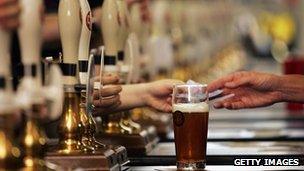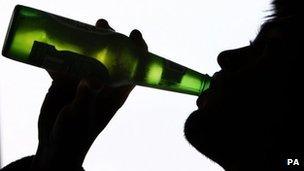Will weaker beers help the brewing industry?
- Published
It's a small change that brewers are hoping customers won't notice.
But several of the nation's favourite beers - including Carlsberg Export, Becks and Stella - are now weaker.
The industry says it will help encourage responsible drinking.
But the move will also help struggling brewers save millions of pounds on tax.
Beer duty
Currently, if you pay £3 for your pint, about £1 will go in tax.
That is because under the mechanism known as the beer duty escalator, beer duty has risen by 2% above inflation each year since 2008.
Next week, the chancellor is expected to increase the duty in the Budget.
The level of tax rises with the strength of the beer and is paid directly by the brewer. The industry says beer duty has risen by 42% in the last 47 months.
So now some companies are reducing the strength of their most popular brands.
It's a move which the British Beer and Pub Association says will help with profit margins.
"This is needed in an industry where brewers are now making as little as a penny on a pint."
In February, a pub chain in Henley-on-Thames sold tax-free beer for a day in an Oxfordshire town to highlight what it said were "staggering" rates of beer duty.
'Losing jobs'

Camra estimates that 29 pubs a week close
For example, Anheuser-Busch InBev, the world's largest brewer, recently cut the strength of Stella Artois, Becks and Budweiser.
It's reported the move will save the brewer £8.6m a year in duty from off-trade sales of Stella alone.
And Carlsberg reduced the alcohol by volume (ABV) of Carlsberg Export from 5% to 4.8% earlier this year.
The firm brews much of its beer for the UK at its huge facility in Northampton.
The company's new UK chief executive, Benet Slay, says the move will help the industry take millions of units of alcohol out of the market each year. But he accepts that it will also help the bottom line.
"We're losing jobs and everyone is under pressure," says Mr Slay.
"So we have to look at a wide variety of things we can do to reduce costs and drive better performance for the business."
The Treasury generates around £3.7bn a year from duty on beer and cider.
Last year, the government changed duty rates to encourage responsible drinking. It pushed up tax on beers above 7.5% ABV and reduced rates on beers below 2.8%.
Campaigners are in little doubt that increasing duty has public health benefits.
"Higher taxes definitely do discourage people," says Eric Appleby, the chief executive of the pressure group Alcohol Concern.
"All the evidence shows that price has a direct correlation with the amount that people drink."
No to weak beer

Some brewers say reducing the strength could affect the flavour of beers
But the pub and beer industry has been going through some rough times.
The Campaign for Real Ale reckons that 29 pubs a week are closing across the UK. Meanwhile, sales of lager fell from £12.7bn in 2006 to £11.4bn in 2011, according to market researchers Mintel.
Brewers claim the UK accounts for 40% of all the beer duty paid across the 27 nations in the European Union.
Micheal Turner, chairman of Fullers, warns there will be more to come if the government increases duty next week.
He predicts 5,000 jobs will disappear in the first year - and 16,000 jobs over a three-year period - if beer duty rises again.
"All the beers you drink - even if they're foreign-owned - nearly all of them are produced in this country and we're going to be crushing one of our last really proud British industries," he says.
Would Fuller's ever reduce the alcohol content of its premier brands?
"Here we concentrate on quality so we try and brew beers to the strength that we think gives the flavour to customers," Mr Turner says.
"So we wouldn't consider reducing the alcoholic content because that will affect the flavour and deliver less to the consumer."
- Published2 March 2012
- Published31 December 2010